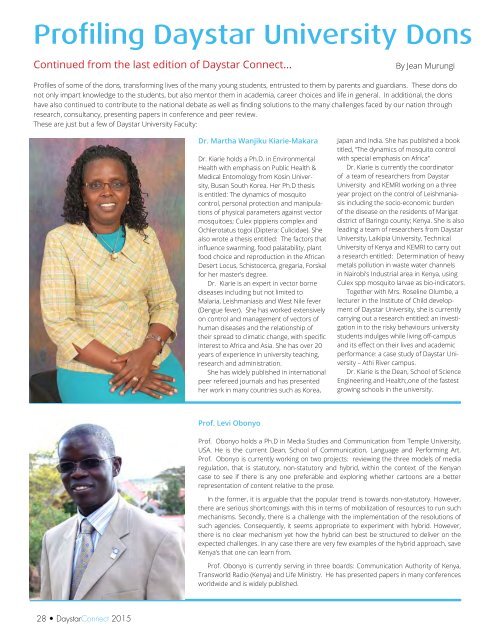our roots
Connect2015
Connect2015
Create successful ePaper yourself
Turn your PDF publications into a flip-book with our unique Google optimized e-Paper software.
Profiling Daystar University Dons<br />
Continued from the last edition of Daystar Connect...<br />
By Jean Murungi<br />
Profiles of some of the dons, transforming lives of the many young students, entrusted to them by parents and guardians. These dons do<br />
not only impart knowledge to the students, but also mentor them in academia, career choices and life in general. In additional, the dons<br />
have also continued to contribute to the national debate as well as finding solutions to the many challenges faced by <strong>our</strong> nation through<br />
research, consultancy, presenting papers in conference and peer review.<br />
These are just but a few of Daystar University Faculty:<br />
Dr. Martha Wanjiku Kiarie-Makara<br />
Dr. Kiarie holds a Ph.D. in Environmental<br />
Health with emphasis on Public Health &<br />
Medical Entomology from Kosin University,<br />
Busan South Korea. Her Ph.D thesis<br />
is entitled: The dynamics of mosquito<br />
control, personal protection and manipulations<br />
of physical parameters against vector<br />
mosquitoes; Culex pippiens complex and<br />
Ochlerotatus togoi (Diptera: Culicidae). She<br />
also wrote a thesis entitled: The factors that<br />
influence swarming, food palatability, plant<br />
food choice and reproduction in the African<br />
Desert Locus, Schistocerca, gregaria, Forskal<br />
for her master’s degree.<br />
Dr. Kiarie is an expert in vector borne<br />
diseases including but not limited to<br />
Malaria, Leishmaniasis and West Nile fever<br />
(Dengue fever). She has worked extensively<br />
on control and management of vectors of<br />
human diseases and the relationship of<br />
their spread to climatic change, with specific<br />
interest to Africa and Asia. She has over 20<br />
years of experience in university teaching,<br />
research and administration.<br />
She has widely published in international<br />
peer refereed j<strong>our</strong>nals and has presented<br />
her work in many countries such as Korea,<br />
Japan and India. She has published a book<br />
titled, “The dynamics of mosquito control<br />
with special emphasis on Africa”<br />
Dr. Kiarie is currently the coordinator<br />
of a team of researchers from Daystar<br />
University and KEMRI working on a three<br />
year project on the control of Leishmaniasis<br />
including the socio-economic burden<br />
of the disease on the residents of Marigat<br />
district of Baringo county; Kenya. She is also<br />
leading a team of researchers from Daystar<br />
University, Laikipia University, Technical<br />
University of Kenya and KEMRI to carry out<br />
a research entitled: Determination of heavy<br />
metals pollution in waste water channels<br />
in Nairobi’s Industrial area in Kenya, using<br />
Culex spp mosquito larvae as bio-indicators.<br />
Together with Mrs. Roseline Olumbe, a<br />
lecturer in the Institute of Child development<br />
of Daystar University, she is currently<br />
carrying out a research entitled: an investigation<br />
in to the risky behavi<strong>our</strong>s university<br />
students indulges while living off-campus<br />
and its effect on their lives and academic<br />
performance: a case study of Daystar University<br />
– Athi River campus.<br />
Dr. Kiarie is the Dean, School of Science<br />
Engineering and Health;,one of the fastest<br />
growing schools in the university.<br />
Prof. Levi Obonyo<br />
Prof. Obonyo holds a Ph.D in Media Studies and Communication from Temple University,<br />
USA. He is the current Dean, School of Communication, Language and Performing Art.<br />
Prof. Obonyo is currently working on two projects: reviewing the three models of media<br />
regulation, that is statutory, non-statutory and hybrid, within the context of the Kenyan<br />
case to see if there is any one preferable and exploring whether cartoons are a better<br />
representation of content relative to the prose.<br />
In the former, it is arguable that the popular trend is towards non-statutory. However,<br />
there are serious shortcomings with this in terms of mobilization of res<strong>our</strong>ces to run such<br />
mechanisms. Secondly, there is a challenge with the implementation of the resolutions of<br />
such agencies. Consequently, it seems appropriate to experiment with hybrid. However,<br />
there is no clear mechanism yet how the hybrid can best be structured to deliver on the<br />
expected challenges. In any case there are very few examples of the hybrid approach, save<br />
Kenya’s that one can learn from.<br />
Prof. Obonyo is currently serving in three boards: Communication Authority of Kenya,<br />
Transworld Radio (Kenya) and Life Ministry. He has presented papers in many conferences<br />
worldwide and is widely published.<br />
28 • DaystarConnect 2015


